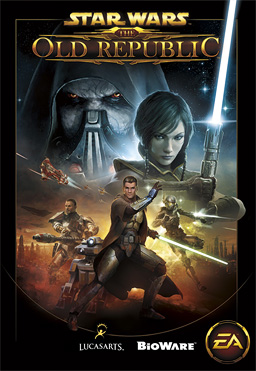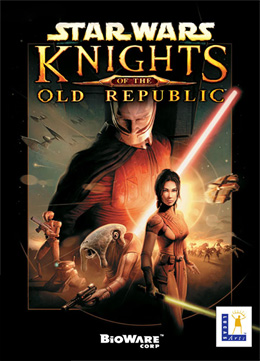
A long time ago, in a galaxy far, far away...
I'm a pretty big Star Wars fan. Not the biggest. Hell, not even the biggest out of my close circle of friends. But by most people's standards, I'm a pretty big fan.
Know what else I'm a fan of? Bioware games. Roleplaying games. Star Wars Bioware Roleplaying Games. My kryptonite. Star Wars: Knights of the Old Republic was a pretty singular experience for me, combining all of these disparate elements into one of the best games I had ever played.
Now, the count of excellent RPG's from Bioware is increased by one with Star Wars: the Old Republic, a bizarre fusion of singleplayer roleplaying and massively multiplayer online roleplaying. This weird little amalgamation of genres shouldn't work, but in some bizarre fashion it does.
I've tried MMO's before. Several. Ultimate Online? Cool, but meh. Evercraft? It was fun getting drunk and falling into the ocean halfway between continents, and to wash up on some strange new shore, but that was about it. Meh. I gave World of Warcraft a shot, but just kind of wandered the woods outside Stormwind while my friends raided dungeons and fought demigods. They got the bug, and they got it bad. Me? Apparently I had some sort of immunity. City of Heroes was close, and that was because of the milieu more than anything. Like I've said before, I love comics. So of course I loved crafting my own superhero story and playing it out day in and day out.
And then we have Star Wars Galaxies. Now, there was an MMO with potential. A game of paradoxes, SWG was simultaneously one of the best MMO's ever made, and one of the worst. It had so much going for it: level-free class system, player controlled economy, multiple enormous worlds that you could do anything you wanted to on, and a sense of wonder. I don't even know how many nights my friends and I were up until sunrise wandering from one horizon to the next, exploring every nook and cranny, floating from one vista to the next. Sure, we did the quests, did the grind whenever we were in the mood for it. But mostly we just wandered, and explored.
It's cheesy, I know, but that game had a bit of magic in it that I have yet to see since. The Morrowind games come close, maybe as close as a single
player game can come, but SWG... No other game have I ever enjoyed making a campfire and literally just sitting at it, watching the stars cartwheel overhead and wild beasts just skirt the halo of light before disappearing back into the night, just for the sake of enjoying it. We'd do this on most nights; set up camp in some undiscovered spit of land on Tattooine or Corellia, let our droids out to do tricks for us, and just talk (in character!) about what we'd seen that day, or what we had planned. What grand adventures we no doubt would be going on the next day, what our ultimate goals and dreams were. The level of immersion of that game was almost magical.
Then of course there was the lack of starships, the interesting but ultimately broken language system, then all of the bizarre things they'd ultimately do with the Jedi. It was fun while it lasted though.
The Old Republic, on the other hand, is a completely different experience. A little more sterile, a little more walled in and already set up for you. There's not quite so much magic that you bring to the game yourself. You don't have to wander around with friends, roleplaying on your own. That's already in the game. Every quest you take, every person/droid you kill. These things all have meaning and weight in the game. There's little grinding, because most everything is paced well enough that you don't need to. You go to an area, talk to a myriad of NPC's that all need your help with something or another, and complete these quests at roughly the same time, earning a certain amount of XP that is calculated to level you up in line with your own personal storyline that will take you to another area at the appropriate time.
This sounds rather bland and run of the mill, and if you look past some aspects of the game it absolutely is. But that’s only if you actually go and completely ignore the more obvious aspects of the game. The typical Bioware skill for telling a story is ever present, in every single fetch quest, every grind mission, every conversation with an NPC.
Much has been made of TOR’s fully voice acted quests, and for good reason. It takes what should be somewhat repetitive grinding and elevates it to something that you actually want to do. You need me find out what’s killing settlers? Sure, no problem! Somebody is stalking your wife? Hey, I’ll take care of it.
Then there is the Storyline that each character class has. The Storyline is a series of quests spanning the entirety of the game that apply only to your character class, and involve your character pursuing some far-reaching goal that is “unique” to you. I say “unique” because every character in that class is experiencing the same story for themselves, though their decisions and the way they go about it may change. This is fantastic, and because of this it’s the first MMO that I’ve actually made three characters in the first month of playing, and played each for at least a few days each. I want to know what each class is doing, what their own story is. And I want to make an original character that actually has a personality, has something that actually is unique to them.
I want to create a story, and thanks to the online component, I can involve others in that story.
I don’t know what this article is. Is it a review? An exercise in compare and contrast? Or just simple, good old-fashioned rambling? A little of each, I think (though probably a little more of the latter than anything else), but mostly it’s just my thoughts and experiences with MMO’s, RPG’s, and Star Wars in general. I have a love/hate relationship with the brand, but despite all the grief I give Lucas and his lackeys, I can’t stop going back to that time that is so long, long ago, and that place so far, far away.
Damn you George Lucas.









